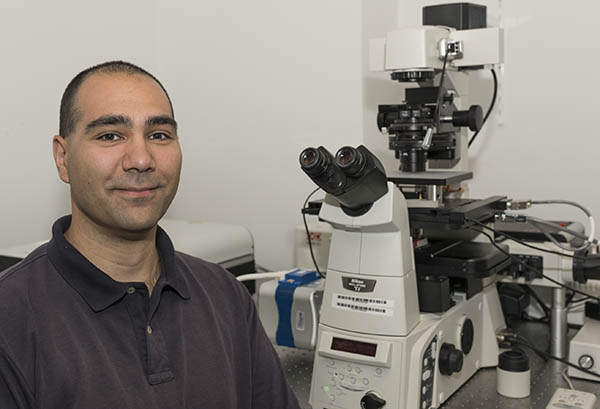
A new RCC-managed high-performance image processing facility for UQ will be designed and built this year, putting the University on par with similar systems at Monash University and universities in the U.S., Europe and Japan.
The facility, currently titled ‘The UQ Deconvolution Engine’, will provide specialist computing hardware to centrally and automatically perform critical image processing on data captured from digital microscopes from any UQ location.
The facility will be particularly useful to those doing cellular research. It will benefit cancer, neurodegenerative disorder, immune system and allergy research, and other related health and medical research.
The project has received full funding; almost $400,000 from the 2017 UQ Research Facilities Infrastructure Grants scheme, and $250,000 from the units likely to use the facility the most, namely UQ’s Institute of Molecular Bioscience (IMB), Queensland Brain Institute (QBI) and the Centre for Microscopy and Microanalysis (CMM).
To date, in collaboration with QBI, IMB and CMM, RCC has developed and deployed computer software, called OMERO, that makes it easy to store microscope images with appropriate metadata, and has developed a robust system for managing image data.
However, without the processing step prior to data storage that the Deconvolution Engine will provide, the image data is of limited value. Raw image data must be processed before storage using special ‘deconvolution’ algorithms that improve the contrast and resolution of digital images.
Current UQ computing facilities are not sufficient to handle the load of existing and new microscopes, creating a data processing bottleneck.
The Engine will leverage recent advances in high-performance computing using Graphics Processing Units (GPUs) to provide a very cost-effective solution.
Importantly, the Engine will be connected to UQ microscopes, other computers and data storage by MeDiCI, RCC’s new data fabric. MeDiCI allows users, regardless of location, to access and share data between all of UQ’s computers, microscopes, and the QRIScloud data repository in the Polaris Data Centre.
Apart from the facility’s main users, IMB, QBI and CMM, the Engine may attract other potential UQ users too, such as the School of Chemistry and Molecular Biosciences, Diamantina Institute, Centre for Clinical Research, and Faculty of Medicine.
Dr Shaun Walters, Research Facilities Manager at the School of Biomedical Sciences, said the School would be delighted to see such a facility. “The benefit to UQ will be significant — every microscope will immediately have a resolution upgrade with such a deconvolution package installed."
RCC will manage the new facility and access will be granted to users by application. All UQ researchers, including RHD students, will be welcome to apply. Contact RCC for more information: rcc-support@uq.edu.au.



